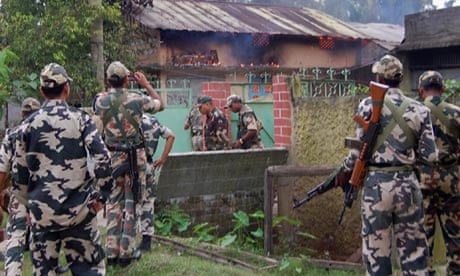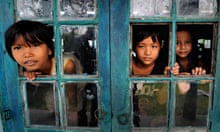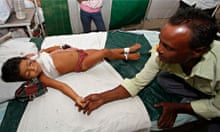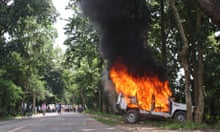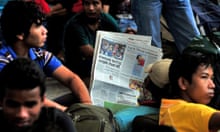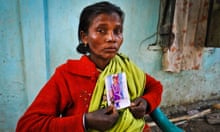Indian paramilitary troops have opened fire on rioters in the north-eastern state of Assam after 21 people were found shot dead and hacked to death with machetes in clashes over land rights.
Around 40,000 villagers have fled to more than 60 government relief camps since violence erupted on Friday between the ethnic Bodo community and Muslims in Assam's western district of Kokrajhar, said the state's police chief, Jayanta Narayan Choudhury. "The situation remains very tense," he told the Guardian on Tuesday.
He denied claims that 3,000 paramilitary troops sent in to quell the violence had been given "shoot-on-sight" orders, but admitted that at least one rioter had been shot dead by police on Tuesday.
"Troops have been told to use the minimum force necessary to stop arson and killing," said Choudhury.
Other reports suggested four people had been killed by security forces during the day.
Overnight, about 80 homes were burned down as the violence spread to neighbouring Dhubri and Chirang districts. Police said 21 bodies were found in the jungle, by the road or by the riverside. Some of the corpses appeared to have been hacked with a machete.
Assam's emergency services were already stretched after coping with floods that have killed at least 125 people this month. More than 70,000 people are still in relief camps after their homes were damaged or destroyed by flood waters and landslides.
The latest violence was sparked on Friday night when unidentified men killed four youths in Kokrajhar, police and district officials said. In retaliation, armed Bodos attacked Muslims, suspecting them of being behind the killings.
At noon on Tuesday the streets of Kokrajhar were deserted until dark smoke suddenly rose into the sky as a mob torched houses just a few hundred metres away from the police station.
Firefighters and paramilitaries rushed to the scene as locals cried for help.
"Why are they doing this? We are poor people and we do not have money to reconstruct our houses," said Moti Devi as she watched her neighbours' house burn. "What did we do wrong? Please keep us safe," she urged troops.
Another villager, who was boarding a bus to flee, said: "We have no idea where our future lies, but we are not safe here. We are extremely terrified to see rioters kill our neighbours and relatives."
Local media reported that 20,000 passengers were stranded on trains in Assam as protesters occupied the tracks and threw stones.
A mob of more than 500 people attacked the Indian Railways' showcase Rajdhani Express train on Tuesday morning, pelting it with stones and bricks as it crossed the state border from West Bengal, forcing it to reverse.
In a sign that the situation threatens to spiral out of control, India's prime minister, Manmohan Singh, on Tuesday ordered Assam's chief minister, Tarun Gogoi, to do "everything possible" to keep the peace in around 400 villages across Kokrajhar, Dhubri and Chirang districts.
The opposition BJP party blamed "illegal immigrants" for the violence, after sending a team to the area to assess the situation. At a press conference in Delhi, a BJP spokesperson, Nirmala Sitharaman, said: "The violence in Assam is completely communal … it is a problem of illegal migrants."
Bodoland Territorial Council chief Hagrama Mohilary said "Muslim migrants" were causing trouble in the Bodoland Territorial Autonomous Districts. "Muslim migrants are crossing the Brahmaputra from different places like Dhubri, Bilasipara, Golakganj and even from Bangladesh," Mohilary said.
Gogoi told reporters that a "third party" was involved in the violence. "We need to find out the culprits and penalise them," he said.
But the Assam police chief said it was wrong to characterise the violence as communal. "These clashes are more ethnic than communal. They are between the Bodo tribe and what we call non-minority groups."
These non-minority groups are mostly Muslims whose ancestors settled in the region 40, 50 or 60 years ago, said Choudhury. Saying he hoped to "contain" the situation for the next two or three days, he said the long-term goal was "to figure out a way for these groups to live together".
Animosity and accusations of land-stealing have long simmered between Bodos and the thousands of mostly Bengali Muslim settlers, many of whom came from the former East Pakistan before it became Bangladesh in 1971. The two groups have clashed sporadically since the 1990s and burned each others' homes and property.
While violence flared in western Assam, up in the north towards the border with Bhutan, 312,533 people were still suffering the after-effects of the worst floods in the state since 2004, according to the Assam State Disaster Management Authority. Almost 70,000 people are still living in 90 relief camps after heavy rains at the end of June.
Activists and NGOs have accused the state of mismanaging funds allocated for flood relief and prevention.
The Assam Human Rights Commission has ordered an inquiry into alleged misappropriation of £1.26m earmarked for flood relief over the last seven years.
Dr Arvind Phukan, a flood-control expert, told CNN-IBN that flood defences were poorly built. "All are inappropriately designed with poor material," he told the TV channel. "The amount of money spent in my personal opinion is misused and the money they have they should be able to come out with a long-term solution and every time it's like a short-term piecemeal emergency solution."
Earlier this month, a well-known activist was beaten up in the Nalbari region of Assam – apparently by government loyalists – after accusing the state of failing flood victims.
Akhil Gogoi, head of a farmers' rights group, KMSS, and a prominent anti-corruption campaigner, was treated in hospital after being ambushed by a gang he claims were members of the Youth Congress party as he toured the flood zone.
Before the assault on 9 July he had strongly criticised the state government's lacklustre response to the worst floods since 2004, singling out the chief minister, Gogoi, for holidaying in the US while his compatriots were struggling at home. So far just one person has been arrested for the attack – a councillor from the Congress party.
